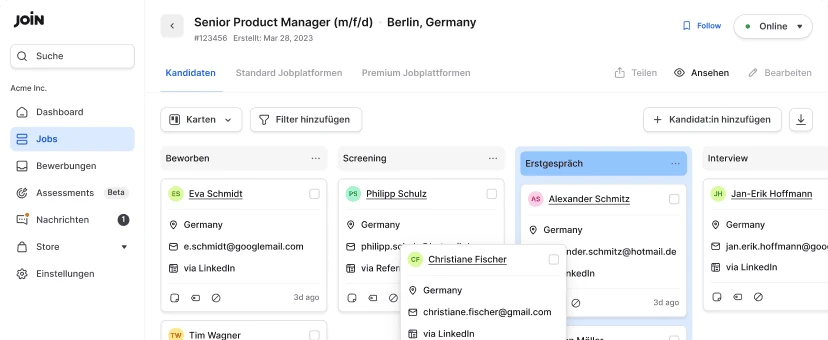Best interview questions for your hiring process
Data Engineer Interview questions
Data Engineers are essential in improving a business’s data transparency and decision-making. Whether by building data pipelines, integrating and analysing data, or creating data systems, a Data Engineer helps organisations use data for performance improvement and evaluation. They’ll work closely with Data Analysts and Data Scientists in creating dataset procedures that enhance the data quality.
During an interview with a Data Engineer, you should check for the following skills:
- Strong knowledge of data modelling.
- Proven experience using databases and data extracting tools.
- Highly skilled in data visualisation.
- Fluency in SQL and other programming languages.
- High level of computing and mathematical skills.
- Excellent communication, critical thinking, and leadership skills.
Interviewing a Data Engineer
Data engineers can help your business make better decisions and improve productivity by producing accurate metrics and business predictions. Therefore, having the first conversation right is essential. The candidate must be confident in answering analytical questions, explaining their experience, and showcasing their business understanding.
To help you make the right decision, we’ve put together these guide interview questions for a Data Engineer. Please note that these questions are to be used during the first stage(s) of the interview process to help you decide early on if the candidate is a good fit for the role or not.
How to open the job interview
Candidates are almost always nervous in interviews, especially early on in the interview process. That’s why, as an interviewer, it is essential to put your candidate at ease, especially at the beginning of the interview.
For this reason, starting your interview with some light and interesting questions linked to the role is always best. The questions should leave room for conversation and help the candidate showcase their personality and talents, so you can assess them better.
Best interview questions for your hiring process
See our Data Engineer job description hereFor the interview
A positive opener to start
What, according to you, is data engineering?
What do you enjoy the most about working with data?
Why did you choose data engineering as a career?
Behavioral Questions
What are some challenges that you faced as a Data Engineer? Describe a problem you worked on.
Explain a moment where you noticed a discrepancy or inefficiency in a company’s data. What did you do?
This will give you an idea of the candidate’s experience level, level of initiative, and problem-solving approach. Furthermore, it will also showcase their unique skills and the creative solutions they might bring to your business.
Walk me through a project you worked on from start to finish.
This will give you a deeper understanding of how the candidate deals with business problems, how they’ll fit in the team, and their organisational ability while working with data.
How do you ensure you get your point across when explaining a complex subject to a non-technical person?
A Data Engineer has to communicate their analysis and findings to business executives. These people may not have a full analytical background. Therefore, they must have excellent communication skills for these tasks.
Soft Skills
What would you do if you were given a task with a technology you weren’t familiar with?
This is a great way to understand a candidate’s response when taken out of their comfort zone and under unfamiliar circumstances. It will showcase their drive to improve and take initiative.
How do you keep yourself organised and motivated when given multiple projects to work on by a specific deadline?
With this question, you can learn how your candidate works under pressure and analyse their time-managing skills and organisation.
What do you find the most challenging thing about being a Data Engineer?
Here you’ll get an insight into the candidate’s honesty and struggles. Data Engineers need to keep integrating new tools and technologies to improve the performance of data systems, which is one of the toughest challenges for them.
If you were to make a mistake when managing the datasets while working on a tight deadline, how would you handle the issue?
Everybody makes mistakes, but knowing how the candidate would react and use their problem-solving skills to approach the issue is essential. It is a great way to show if they are a good fit in your office.
Hard Skills
What are the essential skills required to be a Data Engineer?
Depending on the business, having specific skills will be essential for the position of Data Engineer. These questions will demonstrate your candidate’s strengths and whether their skills match the qualifications for the job.
What tools and programming languages do you have experience with? Which ones do you prefer?
Here, you’ll understand what they can bring to the table regarding programming languages and software programs. You’ll also find out which tools they have experience with and how skilled they are at programming.
Do you have experience transforming unstructured data into structured data?
One of the main tasks of Data Engineers is to turn unstructured data into structured data for data analysis. With this question, you can understand the candidate’s knowledge of data types and practical working experience.
What is your experience with data modelling? Do you understand the different data models?
Data modelling is the first step toward designing databases and analysing data. Since it is a significant aspect of the job position, it’s best to ensure that the candidate is well experienced in this area. They should be able to explain the relationship between model structures and their experiences.
What are some essential features of the software Hadoop? How is it related to big data?
Hadoop is the most common tool for processing big data, and your candidate should be familiar with the framework. This is a great question to verify your candidate’s knowledge and experience in data engineering.
How do data analytics help the business grow and boost revenue?
Ultimately, business growth and revenue generation are crucial for your business. This will give you an idea of the candidate’s understanding regarding business growth, achieving goals, and achieving results with high ROI. Furthermore, it will give you insights into their analytical skills.
Operational / Situational Questions
You are tasked with building a notification system for our business. What would the model look like?
This is a perfect question to understand their approach and knowledge regarding data models. You will be able to go through their thought process and allow them to ask specific questions regarding the situation.
How would you go about designing a database with specific metadata metrics?
It is a common task for a Data Engineer to design databases. Understanding how they analyse and work through their tasks and processes is good. It is an excellent opportunity for the candidate to ask questions regarding the goals and uses of the database and share their knowledge.
What would you do if you were analysing data and found some data suspicious or missing?
This can happen from time to time in a Data Engineer role, so knowing how the candidate would deal with solving the problem and finding a process to avoid it happening again would be ideal.

Start hiring and prepare your interview
All platforms are available for you to promote your job through JOIN.
Create job ad for free


Data Engineers have many responsibilities and will most likely face challenges or emergencies while on the job. So, it is essential to understand how they respond to adversity, their thought process, and their problem-solving skills.